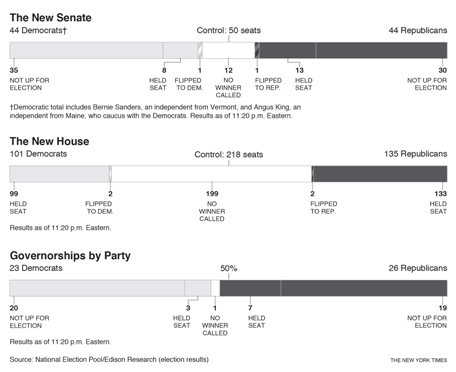Democrats battle for Senate control
As they maintain grip on House majority
By Nicholas Fandos, Carl Hulse and Catie Edmondson
Democrats were on track early Wednesday (4) to maintain a firm grip on the House, but their path to seizing the Senate majority from Republicans was rapidly narrowing as the two parties continued to fight for control of the levers of power in Congress with the fate of the presidency still uncertain.
Partial results suggested that House Democrats were running strong in many of the competitive districts they swept up in 2018, but they were struggling to make further inroads into the Republican-leaning suburbs, where they had expected a surge powered by discontent with President Donald Trump. Instead, as votes continued to be counted, Republicans were newly optimistic they could claw back seats, particularly in rural areas and traditionally conservative strongholds in places like Oklahoma City and Staten Island.
The Senate outcome rested on a handful of states where Democrats still hoped to topple incumbent Republicans, but their pickup opportunities were dwindling fast on an unusually large battleground that stretched from Maine to Alaska and could tilt with the presidential results. At stake was the ability of the next president to fill his Cabinet, appoint judges and pursue his agenda, and the two parties had waged a pitched battle to the end, pummelling voters with advertising backed by record sums of money, totalling hundreds of millions of dollars.
Republicans scored crucial wins in Iowa, Alabama and Montana, and were running stronger than expected in North Carolina and Maine, where the results were still too close to call early Wednesday.
Democrats needed a net gain of three or four seats to take Senate control — depending on whether former Vice President Joe Biden, the Democratic nominee, won the presidency, which would allow his vice president, Kamala Harris, to cast tiebreaking votes.
They flipped seats in Colorado, where John Hickenlooper, the former Democratic governor, easily defeated Sen. Cory Gardner, and in Arizona, where Mark Kelly, a former astronaut, beat Sen. Martha McSally.
But Tommy Tuberville, the former Auburn football coach, easily won back deep-red Alabama from Sen. Doug Jones. In Iowa, the victory by Sen. Joni Ernst over Theresa Greenfield, a Democrat with roots in the state’s farming community, scuttled Democrats’ hopes for a key pickup. And in Montana, Sen. Steve Daines beat back a challenge from the state’s popular Democratic governor, Steve Bullock.
That left both sides closely watching Maine, North Carolina and Georgia, where partial returns showed exceedingly tight races between Republican incumbents and their Democratic challengers.
Earlier, Republicans had breathed a sigh of relief when Sen. John Cornyn was declared the winner in Texas, despite a record turnout, and again when Sen. Lindsey Graham, a close ally of Trump’s, won reelection in South Carolina after a tougher-than-expected race. In Kentucky, Sen. Mitch McConnell, the top Republican, secured a seventh term, although it was unclear whether he would remain majority leader.
“Tonight, Kentuckians said, ‘We’re not finished yet,’” McConnell told supporters in Louisville. “Kentucky wants more of the policies that built the best economy in our nation’s modern history — not socialism.”
At least one Senate race taking place in Georgia, an unexpectedly competitive battleground this year, was headed for a winner-takes-all January runoff that could decide the balance of the Senate only weeks before Inauguration Day if Tuesday’s (3) contests did not. The state’s other race could also end up in a runoff, but it was too early to be certain.
In the fight for the House, Democrats began the night more clearly on the offensive, bolstered by a stunning fundraising advantage, Republican recruitment failures and Trump’s eroding support in America’s cities and suburbs. Two years after gaining 41 seats to reclaim the majority, Democrats were trying to push into suburban districts that Republicans had not lost in decades around St. Louis, Indianapolis, Atlanta, Phoenix, Omaha and even once ruby-red parts of Texas.
But while strategists in both parties had said a second blue wave could wash out 10 to 20 Republicans, by Wednesday morning, returns indicated that no such sweep had materialized. A handful of Republican incumbents in newly competitive suburban districts held onto their seats, and some Democrats who had been confident of victories were vanquished, including first-term Rep. Joe Cunningham of South Carolina, who was defeated by Nancy Mace, the first woman to graduate from the Citadel, in his Charleston-based district.
At the same time, Democrats fell short of snatching victories in solidly red districts that the party had hoped to make competitive, and lost more ground in the increasingly conservative rural Midwest, with the defeat of Rep. Collin Peterson of Minnesota, chairman of the Agriculture Committee, who served three decades in Congress.
“We have held the House and now, when — after all the votes are counted, we’ll see how much better we will do than that,” Speaker Nancy Pelosi said Tuesday night. But she also tried to play down Democrats’ lacklustre performance.
“It’s not just about the quantity,” she added. “It’s about the quality of leadership that they provide for our country.”
Republicans began the cycle hoping to grab onto Trump’s coattails and a booming economy to wrest back the 30 or so districts he won in 2016 that Democrats claimed two years later. But those hopes were dashed by the pandemic, which has left the economy in tatters and the nation counting more than 230,000 deaths to date.
Still, they found some unexpected bright spots Tuesday night. With Trump making significant inroads among Cuban Americans in Miami, Rep. Debbie Mucarsel-Powell, a first-term Democrat, was edged out by Carlos Gimenez, the Miami mayor, and Rep. Donna Shalala lost to Maria Elvira Salazar, a former television anchor.
Republican veterans Ann Wagner of Missouri, Steve Chabot of Ohio and Rodney Davis of Illinois also held off stiff challenges, and Republicans were on track for better-than-expected result in a handful of Texas House races where Democrats had sought pickup opportunities.
-New York Times
T


